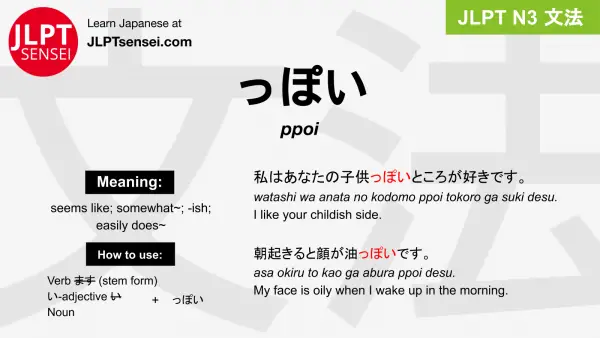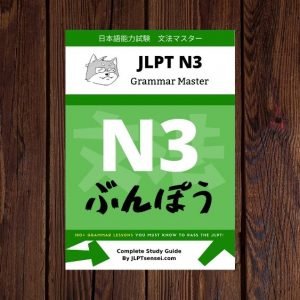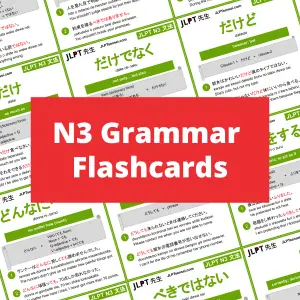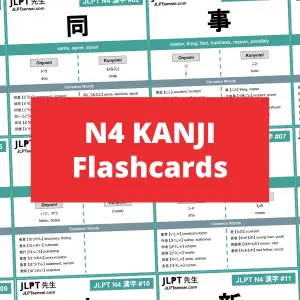Learn Japanese grammar: っぽい (ppoi). Meaning: seems like; somewhat; -ish; easily does; often does ~.
Usage 1: Noun / い-adj + っぽい
When following a noun or い-adjective, this is similar to -ish, -like, -ly.
- 子どもっぽい (kodomo ppoi) = childish, childlike.
- 男っぽい (otoko ppoi) = manly; like a man.
- 女っぽい (onnna ppoi) = womanly; like a woman.
- 油っぽい (abura ppoi) = oily; lots of oil.
Note, the number of adjectives that can be used with this are limited.
See examples 1~6.
Usage 2: Verb + っぽい
When following a verb, the meaning changes to easy to do or often do~.
- 忘れっぽい (wasure ppoi) = easy to forget; often forget.
- 怒りっぽい (okori ppoi) = easy to anger; often angry.
Note, this cannot be used with all verbs.
See examples 7~9.
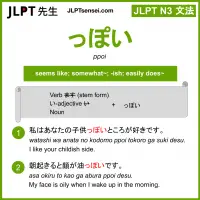
Click the image to download the flashcard.
Download all N3 grammar flashcards.
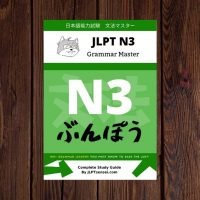
Download our complete
JLPT N3 Grammar Master E-book.
Access ALL extra downloads, ebooks, and study guides by supporting JLPT Sensei on Patreon.
っぽい - Example Sentences 例文
Each example sentence includes a Japanese hint, the romaji reading, and the English translation.
Click the below red button to toggle off and and on all of the hints, and you can click on the buttons individually to show only the ones you want to see.
Example #1
油っぽい食事は好きじゃない。
Example #2
私はあなたの子供っぽいところが好きです。
Example #3
あの小学生は、大人っぽい。
Example #4
朝起きると顔が油っぽいです。
Example #5
この牛乳は水っぽくて、美味しくない。
Example #6
この靴、デザインはいいけれど、生地が安っぽいね。
Example #7
年を取ると、忘れっぽくなる。
Example #8
彼は怒りっぽいが良い友人だ。
Example #9
君は飽きっぽいから何事も成功しないのだ。
Vocabulary List 語彙
| Kanji 漢字 | Kana カナ | English 英語 |
|---|---|---|
| 油 | あぶら | oil |
| 靴 | くつ | shoes |
| 生地 | きじ | fabric; material |
| 牛乳 | ぎゅうにゅう | milk |
| 薄い | うすい | thin |
View all JLPT N3 Vocabulary Lessons
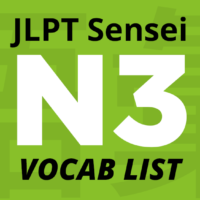
View all JLPT N3 Grammar Lessons
JLPT N3 Study Guide
JLPT N3 Grammar Master [e-book]
Complete Study Guide
This e-book includes every grammar point you need to know in order to pass the JLPT N3, with detailed usage notes and numerous example sentences.
Pages: 378.
Grammar lessons: 182.
